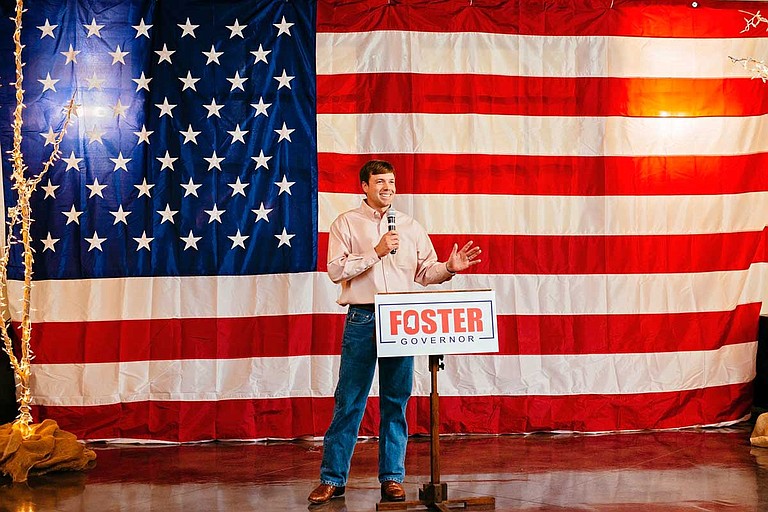Gubernatorial candidates who did speak to The Parents' Campaign include Democrat Jim Hood, who is the fourth-term attorney general; first-term Republican state Rep. Robert Foster (pictured) and Republican Bill Waller Jr., who retired early this year as chief justice of the Mississippi Supreme Court. Photo courtesy Robert Foster Campaign
Tuesday, July 9, 2019
JACKSON, Miss. (AP) — Several candidates for Mississippi governor have answered a questionnaire from a public education advocacy group called The Parents' Campaign, but Republican Tate Reeves has not.
Reeves, the second-term lieutenant governor and former two-term state treasurer, also did not appear last month at a Mississippi Professional Educators board meeting in Biloxi. His campaign spokesman, Parker Briden, said Reeves had an event in Tupelo that day.
Gubernatorial candidates who did speak to the teachers' group were Democrat Jim Hood, who is the fourth-term attorney general; first-term Republican state Rep. Robert Foster and Republican Bill Waller Jr., who retired early this year as chief justice of the Mississippi Supreme Court.
Reeves has the most money among the candidates for Mississippi's top elected office, and he's reminding voters that he helped craft policy the past eight years while fellow Republican Phil Bryant has been governor.
Speaking June 21 at the Mississippi Press Association convention in Biloxi, Reeves said Mississippi students have made academic gains and the high school graduation rate is increasing. He defended putting public money into scholarship accounts for special-needs children to attend private schools. He said the $5 million for that is a small fraction more than $3 billion Mississippi state government spends on education.
"I'm proud of the fact that there are 695 children with special needs who now have the opportunity to go get the education that they deserve. Because we stood up to the powerful special interests," Reeves said.
Critics say the scholarships go to few students while ignoring the broader challenges in education, including the fact that a public schools funding formula has been shortchanged almost every year since it was put into law in 1997. Known as the Mississippi Adequate Education Program, the formula originally was designed to ensure that each school district receives enough money to meet midlevel academic standards. It was written as other states faced equity-funding lawsuits that sought to close the funding gap between wealthy and poor school districts.
The Parents' Campaign, formed in 2006, has pushed for MAEP funding. One question the group asked candidates was: "Will you oppose vouchers that send taxpayer dollars to private schools, religious schools, home schools or virtual schools?"
Waller responded: "We need to focus on letting the current laws regarding charter schools work and examine the results before making any further decisions on vouchers. We need to instead focus on increasing teacher pay to retain and attract quality teachers, and reexamine the testing systems in place to make sure we don't have too many burdensome tests that don't necessarily measure success."
Foster did not answer the questionnaire.
Hood responded: "Mississippi's public schools are severely underfunded, and we rank near the bottom in per pupil spending on education. I don't think we should take taxpayer dollars away from our public schools and put them into the hands of private organizations that aren't held to the same accountability standards as our public schools."
Democratic gubernatorial candidate Velesha P. Williams, a retired Jackson State University administrator, wrote: "My commitment is to adequately fund our public school system. This can be achieved by ensuring MAEP is fully funded. ... I will not support a voucher program over fully funding public education."
Hinds County District Attorney Robert Shuler Smith, also a Democrat running for governor, wrote: "Most likely I would consider vouchers under extraordinary circumstances, such as bullying and other areas that require such alternatives. However, we must fully fund our schools to address the needs of all students."
Briden said Reeves did not answer the Parents' Campaign questionnaire because: "This is a liberal group that has fiercely opposed Tate's efforts to help secure equal educational opportunity for all students, especially special needs students."
Democratic and Republican primaries are Aug. 6, and the general election is Nov. 5.

Comments
Use the comment form below to begin a discussion about this content.
Sign in to comment
Or login with:
OpenID